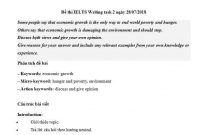
THE ECONOMIC PROBLEM
The economic problem
All societies face the economic problem, which is the problem of how to make the best
use of limited, or scarce, resources. The economic problem exists because, although the
needs and wants of people are endless, the resources available to satisfy needs and wants
are limited.
Limited resources
Resources are limited in two essential ways:
1. Limited in physical quantity, as in the case of land, which has a finite quantity.
2. Limited in use, as in the case of labour and machinery, which can only be used for
one purpose at any one time.
Choice and opportunity cost
Choice and opportunity cost are two fundamental concepts in economics. Given that
resources are limited, producers and consumers have to make choices between competing
alternatives. All economic decisions involve making choices. Individuals must choose
how best to use their skill and effort, firms must choose how best to use their workers and
machinery, and governments must choose how best to use taxpayer's money.
Making an economic choice creates a sacrifice because alternatives must be given up,
which results in the loss of benefit that the alternative would have provided. For example,
if an individual has £10 to spend, and if books are £10 each and downloaded music tracks
are £1 each, buying a book means the loss of the benefit that would have been gained
from the 10 downloaded tracks. Similarly, land and other resources, which have been
used to build a new school could have been used to build a new factory. The loss of
the next best option represents the real sacrifice and is referred to as opportunity cost.
The opportunity cost of choosing the school is the loss of the factory, and what could
have been produced.
It is necessary to appreciate that opportunity cost relates to the loss of the next best
alternative, and not just any alternative. The true cost of any decision is always the
closest option not chosen.
Samuelson's three questions
America’s first Nobel Prize winner for economics, the late Paul Samuelson, is often
credited with providing the first clear and simple explanation of the economic problem -
namely, that in order to solve the problem of scarcity all societies, no matter how big or
small, developed or not, must endeavour to answer three basic questions.
What to produce?
Societies have to decide the best combination of goods and services to meet their needs.
For example, how many resources should be allocated to consumer goods, and many
resources to capital goods, or how many resources should go to schools, and how many
to defence, and so on.
How to produce?
Societies also have to decide the best combination of
factors to create the desired output of goods and
services. For example, precisely how much land, labour,
and capital should be used produce consumer goods
such as computers and motor cars.
For whom to produce?
Finally, all societies need to decide who will get the
output from the country’s economic activity, and how
much they will get. For example, who will get the
computers and cars that have been produced? This is
often called the problem of distribution.
có thể bạn quan tâm

Khám phá Problem Steps Recorder của Win 7
7
965
362
Cơ sở dữ liệu
7
(New)

IELTS Writing task 2 - chủ đề chủ đề economic
4
4.257
770
Luyện thi IELTS
4
(New)
.jpg)
Correlations Between Labor Employment And Economic Growth
6
1.206
390
Tài liệu kinh tế khác
6
(New)
thông tin tài liệu
Economics is not primarily a collection of facts to be memorized, though there are plenty of important concepts to be learned. Instead, economics is better thought of as a collection of questions to be answered or puzzles to be worked out.
Studying economics helps you understand the major problems facing the world today, and prepares you to be a good citizen and helps you become a well-rounded thinker.
Mở rộng để xem thêm
từ khóa liên quan
tài liệu mới trong mục này
tài liệu hot trong mục này
tài liệu giúp tôi
Nếu bạn không tìm thấy tài liệu mình cần có thể gửi yêu cầu ở đây để chúng tôi tìm giúp bạn!
×



